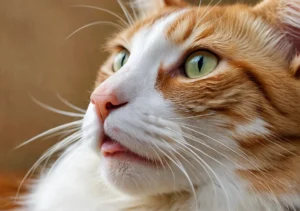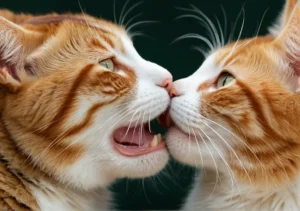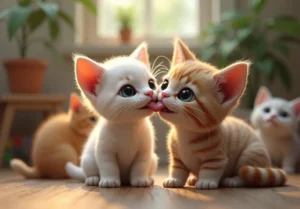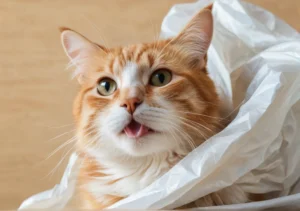Cats can be quirky little creatures, and their behavior often leaves us scratching our heads. One curious habit is their tendency to lick rock salt. What drives this odd attraction?
Cats lick rock salt primarily due to its mineral content, which can be appealing to them. Salt can sometimes provide a source of electrolytes, especially for cats that may be lacking in certain minerals in their diet.
What makes salt appealing to cats
Cats are notorious for their quirky habits, and licking rock salt definitely falls into the curious category. One major factor is the salt’s inherent taste. Like humans, cats can be drawn to salty flavors, and some studies suggest they may crave it more than we’d expect. This interest isn’t entirely out of the blue—cats are obligate carnivores, which means their diet consists mainly of meat, often containing sodium.
Additionally, while cats don’t strictly need salt in their diet like some other animals do, they may still instinctively seek it out. Salt acts as a natural electrolyte, helping regulate various physiological processes. When your cat gets extra active or even just after a long, lazy day, it might be their way of seeking out a little flavor boost or revitalization from mineral depletion.
It’s worth noting that not all salt is created equal. Rock salt, for instance, has larger crystals that can be intriguing for a kitty to lick. The texture might feel good on their tongues, providing a little stimulation, just as a catnip toy might.
What minerals do cats need
A well-rounded diet is key for your furry friend’s health. Cats need several essential minerals to keep them thriving. Here’s a quick breakdown of vital minerals and their roles:
- Calcium: Crucial for strong bones and teeth, calcium helps with muscle function and nerve signaling.
- Phosphorus: Works alongside calcium, it supports healthy kidney function and energy production.
- Potassium: Vital for heart health, potassium also assists in muscle function and nerve communication.
- Magnesium: Important for enzyme function, magnesium aids in many bodily processes, including muscle and nerve function.
- Sodium: While cats generally get sufficient sodium from their diet, it’s still necessary for maintaining fluid balance and proper nerve function.
While most premium cat foods cover these bases, it’s good to double-check that your cat’s diet is balanced. Look for food labeled as complete and balanced, which indicates it meets the AAFCO nutrient profiles. If you feel something’s off, consulting your vet is always a smart move. They can offer tailored advice based on your cat’s specific needs.
For more detailed information on essential minerals for cats, check out the resources provided by the American Association of Feed Control Officials.
How does salt affect a cat’s health
Cats may lick rock salt out of curiosity or even a mineral deficiency. While small amounts of salt can be safe, excessive consumption can lead to serious health issues. An important aspect to understand is how salt significantly impacts a cat’s hydration and overall health.
Salt helps in maintaining the balance of fluids in a cat’s body, but too much can disrupt this balance. When a cat consumes high levels of salt, it could lead to dehydration. This can cause symptoms like increased thirst, frequent urination, and in more advanced cases, could affect their kidneys.
Another consequence is sodium ion poisoning, which can occur if a cat ingests excessive amounts of salt. Symptoms to watch for include vomiting, diarrhea, tremors, and even seizures. Maintaining a safe environment with minimal access to rock salt is crucial, especially in colder months when it’s used for ice melting. If you notice your cat licking rock salt, it’s wise to consult your vet to ensure their dietary needs are met and to keep harmful items at bay.
To promote your cat’s health and safety while ensuring they don’t lack necessary nutrients, consider offering them high-quality cat food that provides all essential vitamins and minerals.
Can cats ingest too much salt
It’s true—cats can ingest too much salt, and it’s important to be aware of the risks involved. Consuming excessive salt can lead to significant health problems, making it crucial for cat owners to recognize the signs of salt toxicity.
Here are some symptoms associated with too much salt consumption:
Vomiting : Often the first sign, indicating that something isn’t right.
Diarrhea : In some cases, this might occur alongside vomiting.
Increased thirst : Cats might drink more water as their body tries to balance out the sodium levels.
Frequent urination : You’ll notice your cat making more trips to the litter box.
Tremors or seizures : Severe cases can affect the nervous system.
It’s vital to monitor your cat’s behavior when they have access to salt, whether from rock salt or other sources. If you observe any of these symptoms, don’t hesitate to contact your veterinarian. They may recommend treatments, such as IV fluids, to rehydrate and rebalance electrolytes.
Knowing these signs empowers you to act swiftly, ensuring your furry friend stays healthy and safe. You can also check this comprehensive guide from the American Society for the Prevention of Cruelty to Animals (ASPCA) for more details on cat safety: ASPCA Poison Control.
Why do some cats prefer licking salt over food
Cats love a little variety in their lives, and sometimes that includes an odd attraction to rock salt. One reason could be their natural instincts. Cats are obligate carnivores, which means their diets are primarily meat-based, but they also have a natural drive to seek out minerals that may enhance their health. Salt, in small amounts, is vital for bodily functions, so they might simply be following their instincts when they lick it.
Another angle to consider is the texture of salt. Cats are known for their tactile preferences, and the crunchy, gritty feel of rock salt might be appealing. It could be a sensory experience that they enjoy, similar to how they often chase and bat at small objects.
Additionally, stress can play a role. Cats might lick salt as a coping mechanism when they’re feeling anxious or bored. This behavior might provide a sense of comfort, distracting them from whatever’s bothering them. To manage this, it’s essential to keep their environment enriched with toys, climbing structures, and interactive playtime.
Does licking salt indicate a deficiency
An attraction to licking salt could potentially indicate that a cat is looking for certain nutrients. Some common deficiencies that might drive this behavior include:
- Sodium deficiency: While rare, cats sometimes require more sodium, especially if they’re on a homemade or raw diet that doesn’t balance their electrolytes adequately.
- Dehydration: Cats that aren’t drinking enough water might instinctively seek out salt, as it can stimulate thirst.
- Diet concerns: If their regular food lacks variety or essential nutrients, they might turn to salt as an alternative source.
The desire for salt isn’t always detrimental, but it’s important to ensure it doesn’t become a habit. Too much can lead to health issues like hypernatremia, a condition caused by excessive sodium intake.
For further reading on feline nutrition and common deficiencies, check out the resources available at The Association of American Feed Control Officials (AAFCO).
Always keep an eye on your cat’s habits and consult your veterinarian if you notice excessive salt licking or other concerning behaviors. Remember, a balanced diet is key to keeping them happy and healthy.
What are the common sources of rock salt for cats
Cats often encounter rock salt in several everyday situations, primarily during colder months. One common source is sidewalks and driveways. Many municipalities use rock salt to melt ice, leaving residual salt on the ground. If your cat roams outside, it might be tempted to lick or munch on this salty treat, likely due to its curiosity or the unusual taste.
Homes can also introduce cats to rock salt through de-icing agents. Those bags of salt set aside in garages or storage areas can pique your feline friend’s interest. Additionally, some cat foods or treats might have trace amounts of salt for flavor enhancement, which could create a salt-seeking behavior.
Understanding why cats find rock salt enticing doesn’t just stop at taste. The sodium in the salt may mimic flavors they instinctively seek out, making it almost like a snack for them. It’s essential to monitor their exposure to ensure it doesn’t become problematic.
Are there risks associated with rock salt
While the notion of cats enjoying a lick of rock salt might seem harmless, there are substantial risks worth noting. Excessive salt intake can lead to hypernatremia, a condition caused by elevated sodium levels in the blood. Symptoms of this condition include vomiting, diarrhea, and in severe cases, seizures.
Additionally, if a cat licks rock salt off their paws or fur after being outside, they could inadvertently ingest harmful substances, such as chemical de-icers that pose serious health risks.
Here’s a brief rundown of potential dangers associated with rock salt for cats:
- Dehydration: High salt intake can lead to dehydration as cats may drink more water than usual.
- Kidney damage: Over time, excess salt can put a strain on their kidneys, leading to potential damage.
- Gastrointestinal issues: Vomiting and diarrhea are common initial reactions to salt toxicity.
It’s crucial to keep your surroundings safe. Regularly check your cat’s paws for any residual salt after outdoor activities, and avoid using salting agents that could be harmful. For more detailed information on preventing pet toxicity, the ASPCA offers great resources at ASPCA Poison Control.
Fun facts about cats and salt
Cats have some quirky habits, especially when it comes to their attraction to salt. It’s not just a random quirk; there are valid reasons behind it.
For starters, cats can have a natural craving for sodium, an essential nutrient, albeit in small amounts. Unlike some animals, they can’t synthesize it on their own, making it crucial for maintaining proper bodily functions. This craving may lead them to lick substances like rock salt, which contains sodium in plentiful supply.
Another interesting tidbit is that salt can be part of a cat’s instinctual behavior. They often seek out mineral-rich substances, which in nature could help with hydration and nutrients while hunting or scavenging. It’s a throwback to their wild ancestors, where every little advantage counted.
Here are a few fun facts about cats and salt:
Taste Buds : Cats lack taste buds for sweetness. They might be drawn to the saltiness instead, savoring flavors that are more impactful for their palate.
Dehydration : Licking salt can help them feel hydrated temporarily. Since cats generally don’t drink enough water, they might subconsciously seek out salt to stimulate thirst.
Behavioral Factors : Boredom or stress can lead to these licking habits. If a cat feels anxious or is looking for stimulation, it might gravitate toward licking strange objects, like salt.
Age-Related Changes : Senior cats, in particular, might have a heightened sense of taste towards salt, potentially due to changes in their dietary needs.
Health Signals : Excessive licking can sometimes signal underlying health issues, so keep an eye out and consult a vet if your cat’s behavior seems unusual.
If you notice your cat engaging in this behavior frequently, ensure they have a well-rounded diet and minor salt exposure. Regular vet check-ups are also essential to rule out any health concerns. Check out the resources provided by the American Association of Feline Practitioners for more insights on feline nutrition and well-being here.
Alex, a passionate animal lover, has experience in training and understanding animal behavior. As a proud pet parent to two dogs and three cats, he founded AnimalReport.net to share insights from animal experts and expand his knowledge of the animal kingdom.




